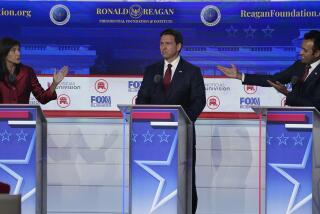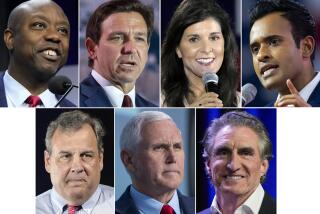Republicans for ‘Sesame Street’
I am a conservative Republican and first vice chairman emeritus of the GOP in one of the nation’s famously Republican counties, Orange County. I will vote for Mitt Romney and will encourage others to do so. However, if he becomes our next president, I will join hands with millions of others to vigorously oppose his goal to eliminate federal funding for PBS.
The reasons for keeping funding are simple, if not readily apparent to Romney. Let me explain.
Our nation’s economic and social prosperity depends on a highly literate population. Studies have shown that increasing literacy reduces crime along with the $73 billion spent per year on unnecessary health expenses attributed to poverty. And according to the Economist, the 25 fastest-growing jobs in the United States require workers with higher than average literacy skills. Yet nearly half of American children are not prepared to succeed when they enter kindergarten. Children in poverty are at an even greater disadvantage, especially in literacy skills. Seventy percent of all eighth-graders and 65% of all 12th-graders read below their grade level.
COMMENTARY AND ANALYSIS: Obama vs. Romney
Not all children have access to the best schools or curricula. That’s why PBS is so important. Today, PBS, along with its websites and mobile apps, is the nation’s largest classroom. It is the No. 1 media content source for preschool teachers and the undisputed leader in children’s programming. According to Nielsen, 82% of children ages 2 to 11 watch PBS, and 10 million children access pbskids.org every month. It is free for all who use it.
Dozens of rigorous, independent studies have shown that PBS children’s programming results in dramatically improved literacy skills, which narrows the achievement gap between low-income and middle-income kids and increases the desire of kids to read and visit libraries and bookstores. The impact of PBS on preparing preschoolers for school, especially among low-income families, is nothing less than astounding.
Research also demonstrates that students involved with the fine arts achieve higher levels of academic success. Most of us know from personal experience that the arts bring people together, break down barriers, expand horizons and help spirits soar. Yet schools are cutting arts programs, and commercial television has all but abandoned the arts. This makes PBS, as well as the Internet, an important portal to the arts.
TRANSCRIPT: First presidential debate
Public TV’s “Austin City Limits,” “Great Performances” and other shows — whether viewed on the air or on podcasts or over the Internet — are the main way many Americans, especially older, lower-income, ethnic minority and rural Americans, can participate in theater and concerts.
For example, when Gilbert and Sullivan’s “H.M.S. Pinafore” was taped at the Guthrie Theater in Minneapolis, it played to a sold-out crowd. However, more than 2.1 million Americans had a front-row seat watching it on PBS. Had PBS viewers purchased tickets, the theater would have been sold out 1,900 times.
Public media provide the platform on which “Sesame Street” and other noncommercial programs offer preschool literacy and math learning for millions of children, especially those in low-income families. PBS brings world-class professors to the most remote schools in the country through “virtual high schools” it operates across the United States. PBS runs the most comprehensive GED program for hundreds of thousands of people whose high school education was interrupted prior to completion.
PBS is an excellent investment. For every dollar received from the federal government, PBS stations (all of which are locally owned and controlled) raise six dollars. Zeroing out federal funding for public broadcasting won’t end “Sesame Street,” which has many funding sources, but it could end the broad reach of PBS and its ability to get Big Bird and so much more to rural areas and small towns where it’s needed most.
PBS treats its audience as citizens, not consumers. Its value is proven: 123 million Americans watch PBS each month and, for the ninth consecutive year, polling by the nonpartisan research companies Harris Interactive and ORC Online Caravan found that PBS is rated as the most trustworthy among nationally known organizations (including Congress and the courts). Seventy-nine percent of the public supports continuing public television’s current level of funding, and, despite what you hear, 53% of political conservatives (like me!) oppose elimination of federal funding for PBS.
The public-private partnership of public television unquestionably reaps enormous dividends, not only educational and cultural but economic as well. Far from being a cultural luxury, PBS is a proven national asset that must be preserved and protected.
Jo Ellen Chatham is co-chairman of the PBS SoCal (KOCE) board of trustees.
More to Read
A cure for the common opinion
Get thought-provoking perspectives with our weekly newsletter.
You may occasionally receive promotional content from the Los Angeles Times.










